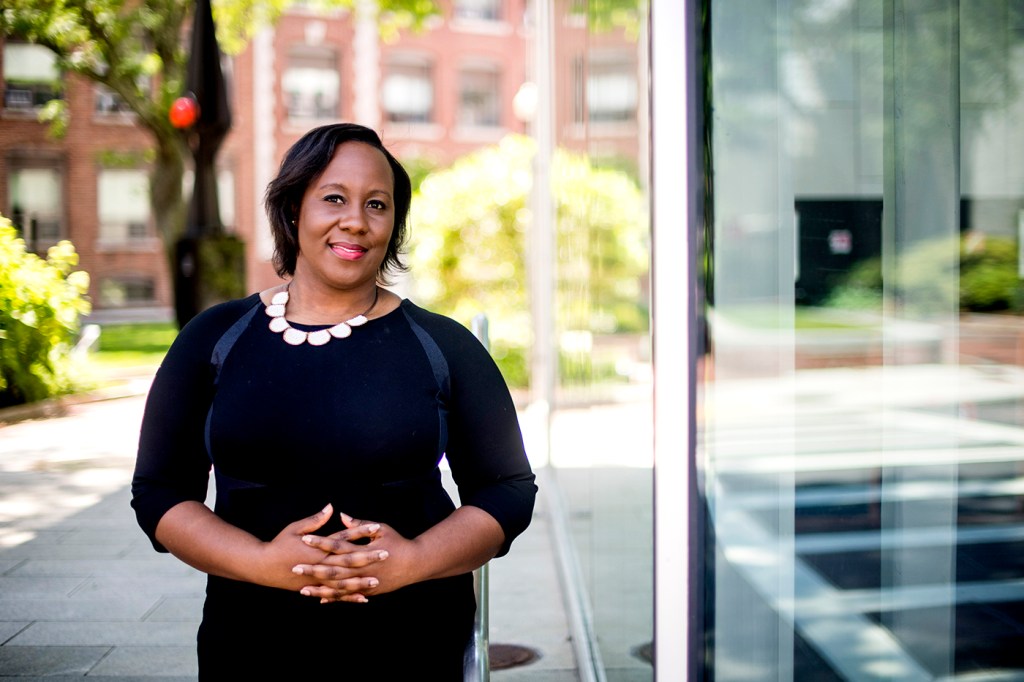She’s helping Black and other under-represented law students move from the classroom to the courtroom

Students of color had a dilemma, and Lisa Brathwaite was determined to find a solution.
Although the number of students of color in law school was increasing, the number serving in prestigious postgraduate judicial clerkships was not. These positions can help graduates get courtroom experience, make valuable connections, and transition into a law career.
Brathwaite, program manager and student relations specialist in the Center for Co-op and Career Development in Northeastern’s School of Law, saw this disconnect and created a pipeline for the law school students of color to postings as judicial clerks. This involved bringing non-white judges to campus to speak about their experiences and create an environment in which students could learn about the opportunities a clerkship can provide, and make connections with judges who could hire them in the future.
“That program has been very rewarding to see the numbers start to increase for students of color,” Brathwaite says. “It really has come full circle from a thought we had, to actually materializing, and seeing the student interest in this path.”
For her leadership contributions and the impact she has made across the university, Brathwaite has been awarded the 2020 Dr. Delia Cheung Hom Award by NU DREAM, Northeastern’s faculty and staff of color affinity group. Brathwaite is also enrolled in the Masters of Education program at Northeastern, with a focus on higher education administration.
The positions that concerned Brathwaite, judicial clerkships, are postgraduate opportunities in which graduates work as full-time assistants to judges, and carry out a wide range of administrative and legal tasks.
Brathwaite put together an all-day conference to help law students find mentors and opportunities for clerkships, first in 2018 and again in 2020. Students say the program has had an impact in meaningful and tangible ways—Kaila Clark, a 2020 graduate of the law school, attended the conference in 2018, when Raheem L. Mullins, associate justice on the Connecticut Supreme Court, was the keynote speaker. Now, Clark works for Mullins as a judicial clerk.
Clark credits Brathwaite for bringing Mullins to campus, and for ensuring that she connected with him and kept in touch after the event.
Nima Eshghi, assistant dean of Center for Co-op and Career Development, credits Brathwaite for her approach to organizing events.
“We are always identifying opportunities and events where our students of color and other underrepresented students can make connections and advance their careers,” Eshghi says. “Lisa takes that concept further; she takes care to prepare the pathway for our student-attendees as well—giving them the tools so that they arrive prepared and ready to engage, and put their best foot forward.”
Brathwaite also works with the affinity groups, resource groups for people with similar backgrounds or interests, in the law school, including the Black Law Student Association and the Queer Caucus. A first-generation student herself, Brathwaite co-founded the first-generation law student group. She runs the mid-quarter check-ins with students on co-op. She connects students in other cities with affinity groups hosted by the local bar associations.
And, Clark says, Brathwaite makes it clear that she cares about more than academics.
While Clark was on co-op in Boston, her mother had a stroke in New York. She had to take time off from her co-op to go home and help her family navigate the new situation, which involved trying to get unemployment insurance and new health insurance for her mother. Brathwaite heard about the situation and reached out to Clark to put her in touch with people in New York and make sure she wouldn’t have to end her co-op early or take a leave of absence from school, but also check that she was doing okay on a personal level.
“I could never repay her for that,” Clark says. “She went above and beyond the call of duty. It’s not in her job description, but she cares about students and makes sure we don’t just survive law school, but thrive in law school.”
Clark says Brathwaite would continually ask for feedback about what students needed, and try to provide resources to meet those needs. Those resources came in the form of mentorships, career planning advice, or speakers and other guests who held positions to which students aspired.
“She was trying to figure out what support looks like, but she never assumed it,” Clark says.
The sentiment is echoed by Eshghi, who says Brathwaite has the talent to understand what students are asking for.
“Lisa has excellent judgment in assessing and translating students’ needs into actionable items,” Eshghi says. “She recommends and designs programs and initiatives that our office can collaboratively act on to address the varied needs of underrepresented students.”
Brathwaite says she was shocked when she got the email about the award, and never imagined her coworkers would have the time to nominate her for an award while the department made the transition to remote work because of the COVID-19 pandemic.
She says she is honored to receive the award, but mostly pleased that she gets to support students of color and first-generation students at this point in her career.
“I understand what it’s like to be there and I, too, want to help those in school right now because I’ve been helped,” Brathwaite says. “I know it’s been a hard road sometimes, especially for first-generation students not understanding how to navigate higher education. There are people that help me today, and I want to do that for other students.”
For media inquiries, please contact media@northeastern.edu.




